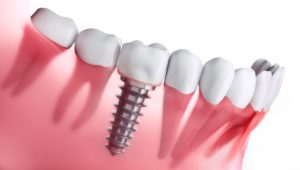 After being introduced in the 1980s, dental implants have become the gold standard for tooth replacement around the world. Numerous studies have shown that after 10 years, about 95% are still firmly in place. This is because implants use a small titanium post to replace the root of a tooth, something no other treatment does. However, a small percentage do fail, sometimes in the first few months, or after years of normal use. Why? Here are the top 3 reasons for dental implant failure in Marshall.
After being introduced in the 1980s, dental implants have become the gold standard for tooth replacement around the world. Numerous studies have shown that after 10 years, about 95% are still firmly in place. This is because implants use a small titanium post to replace the root of a tooth, something no other treatment does. However, a small percentage do fail, sometimes in the first few months, or after years of normal use. Why? Here are the top 3 reasons for dental implant failure in Marshall.
1. Poor Bone Quality
In order for an implant to be successful, a patient needs a certain amount of healthy jawbone to support the new titanium root. If someone has been missing teeth for a long time or has a condition like diabetes or osteoporosis, the bone can easily become quite thin or brittle over time. Weakened jawbone won’t be able to hold an implant in place, especially when exposed to chewing forces. To help with this, many dentists may choose to build up the jawbone with a bone graft before placing implants.
2. Teeth Grinding
Research indicates that about 1 in 3 Americans experiences bruxism, or unconscious teeth grinding while sleeping. This habit can expose the teeth to forces much stronger than regular biting and chewing, and they can be enough to break a crown attached to an implant. Reducing daily stress can help lessen or eliminate this habit, or a patient can start wearing a nightguard to bed, which is a small oral appliance that places a barrier over the teeth.
3. Periodontal (Gum) Disease
Even though implants themselves are immune to infection and decay, the bones and gums needed to support them are not. If a patient doesn’t consistently clean their teeth, it’s easy for plaque and bacteria to build up around the base of an implant. Eventually, this can lead to an infection called peri-implantitis, where the infected gum and bone tissue actually start to break down. This can make an implant start to feel loose and even fall out if left untreated. Fortunately, simply practicing basic oral hygiene and attending regular checkups can prevent it from ever developing.
Conclusions
It should be noted that if you visit an experienced implant dentist, they’ll be able to head off a lot of these potential problems before they even begin. They will examine your jaw to make sure it is strong enough, see if your teeth look like they have been grinding, and they’ll be able to assess the level of bacteria in your mouth. If they see the potential for implant failure, they’ll be able to provide the appropriate solution so you won’t experience any issues with your new teeth.
About the Author
Dr. Charles Parker has provided dental implants in Marshall for more than 30 years. In addition to his decades of experience, he also uses the latest tools so he’s able to help his patients in the fastest and most comfortable way possible. If you’re interested in learning more about dental implants and what they could do for your smile, he can be contacted through his website.
 Request A Free Consultation
Request A Free Consultation
